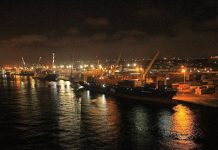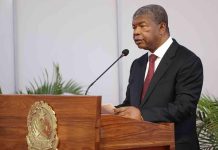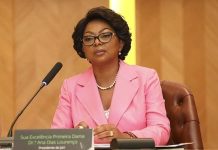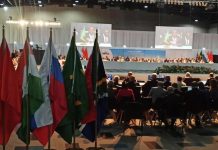Africa-Press – Angola. The African Union Peace and Security Council (AU-PSC), comprising Angola’s permanent representative to the continental organization, Ambassador Miguel Domingos Bembe, assessed the political transition process in Gabon.
The AU-PSC carried out a field mission to that country, suspended from the continental organization’s activities since the coup d’état that took place on August 30, 2023, which ended on Saturday, after meetings with former President Ali Bongo and the former president of the African Union Commission (AUC), the Gabonese Jean Ping.
During this meeting, which constituted the high point of the agenda of the AU-PSC field mission, the body was received by the transitional president of Gabon, General Brice Clotaire Oligui Nguema.
As part of this mission, the AU-PSC also held consultation sessions with the transitional Prime Minister of Gabon, Raymond Ndong Sima, with parliamentary and judicial entities and with representatives of civil society organizations.
The body took note of the general report of the Inclusive National Dialogue (DNI), held last April, in the presence of the President of the Central African Republic, Faustin-Archange Touadéra, mediator of the Economic Community of Central African States (ECCAS) for the situation in Gabon.
The forum, which adopted recommendations aimed at guiding the process of drafting the new Constitution and formulating political, social and economic reforms, created a committee of experts that has already presented a preliminary draft of the constitution for consideration by the transitional parliament.
A note from the Angolan Embassy in Ethiopia states that the adoption of the Constitution is scheduled for December this year, through a referendum. According to the document, the transition process is expected to end with the holding of general elections, under a new law, in August 2025.
In this regard, the AU-PSC encouraged the transitional authorities and Gabonese civil society to accelerate the process of returning the country to the path of democracy, freedom, justice and transparency, in order to facilitate its reintegration into the African Union.
To this end, he appealed to the Transitional Government of Gabon to comply with the timetable established for the restoration of constitutional order in the country.
Participation by Jean Ping
The participation of Gabonese Jean Ping in the political transition process in Gabon is highlighted by the fact that the former president of the African Union Commission (AUC) is a diplomat and politician with considerable experience.
He was elected President of the African Union Commission on 1 February 2008, in the first round of voting, and was also Minister of State and Minister of Foreign Affairs, Cooperation and Francophonie of Gabon, from 25 January 1999 to 6 February 2008.
In 2003, he was permanently appointed Minister of Foreign Affairs, a post he left to be elected President of the African Union Commission, as a candidate of the Economic Community of Central African States (ECCAS), taking office on 29 April 2008, replacing the former President of Mali, Alpha Oumar Konaré.
Country elected three times in the body
Angola is on the African Union Peace and Security Council for the fourth time. Since its establishment in 2004, the country has been elected three times, the first time for a three-year term (2007-2010) and the others for two years (2012-2014 and 2018-2020). The body is a decision-making and permanent body for the prevention, management and resolution of conflicts in Africa.
As a result, the Angolan ambassador to Ethiopia, Miguel Domingos Bembe, considered the country’s presence in the body to be essential, as it acts as a collective security and early warning structure to facilitate, in a timely manner, an effective response to conflict and crisis situations on the continent.
The country has sought to play an increasingly assertive and dynamic diplomatic role in regional, continental and international organizations, with the aim of contributing to the processes of consolidating peace, stability, security and sustainable development in Africa, taking into account its experience in the prevention, management and peaceful resolution of conflicts.
In July of this year, Angola assumed the presidency of the Peace and Security Council of the African Union, having produced, during its consulate, ten diplomatic initiatives on the monthly agenda of that body.
Speaking about the outcome of the Angolan presidency of that strategic AU body, Miguel Domingos Bembe, who headed the Angolan presidency of the AU-PSC, considered the mission successful.
Despite only lasting a month, the Angolan diplomat said that the country took the opportunity to align, once again, its priorities with the consolidation of the general and specific objectives defined within the scope of its two-year mandate (2024-2026) in that body.
The Angolan diplomat said that the country’s priorities include promoting peace and security, through the application of the principles of peaceful resolution of conflicts on the African continent, with priority given to inclusive dialogue and responsible tolerance, as well as contributing to regional and continental stability, with the promotion and support of conflict resolution initiatives and the alleviation of potential tensions through mediation and preventive diplomacy.
For More News And Analysis About Angola Follow Africa-Press






